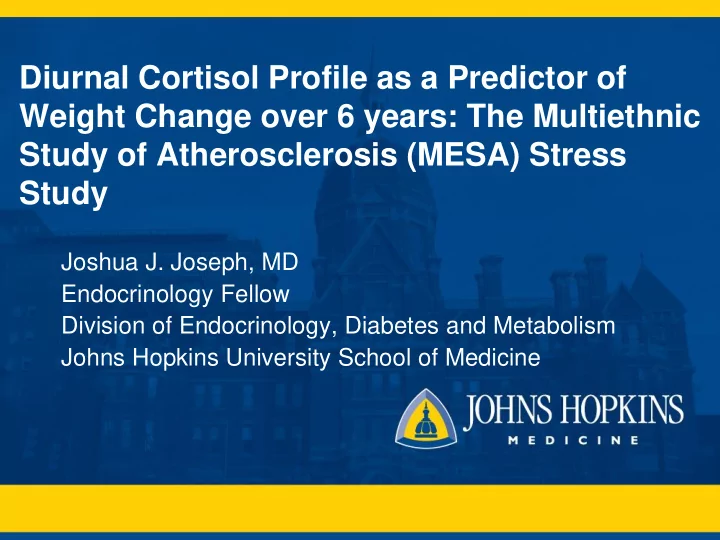

Diurnal Cortisol Profile as a Predictor of Weight Change over 6 years: The Multiethnic Study of Atherosclerosis (MESA) Stress Study Joshua J. Joseph, MD Endocrinology Fellow Division of Endocrinology, Diabetes and Metabolism Johns Hopkins University School of Medicine
Background Hypothalamic-pituitary-adrenal (HPA) axis - controls the response to stress - participates in the regulation of many processes that affect energy storage and expenditure
Background The effector molecule of the HPA axis is cortisol production from the adrenal gland
STRESS STRESS
Subclinical Hypercortisolism and Obesity Physical Abuse STRESS Sleep Apnea Sexual Abuse Work Stress, Low SES, History of Trauma Sleep Deprivation Anxiety, Depression, PTSD 50-70 Million 57 Million Americans Americans Cortisol Diurnal Cortisol Variability OBESITY
Hypothalamic – Pituitary – Adrenal Axis & (-) Obesity (- ) OBESITY Adapted from Miller et al, Biological Psychiatry, 2006 .
Challenges to neuroendocrine assessment in population studies • Epidemiological studies • Circadian variation in limited by imprecise cortisol secretion measures of glucocorticoid exposure • Gold standard: 24-hour urine free cortisol - cumbersome • Hypothalamic and pituitary hormones – Pulsatile, labile – Limited utility in measurement directly or from stored samples
Challenges to neuroendocrine assessment in population studies • Salivary cortisol – Non-invasive – Timed collection – Free-living state – Free cortisol measured – Stable for several days prior to processing (frozen, mailed)
Diurnal Cortisol Profile A=Waking cortisol B=Cortisol awakening response C=Early decline D=Late decline Time Zero 30 min 2 hours Bedtime Champaneri et al, Obesity , 2012
Cross-Sectional Analysis of BMI vs. Cortisol • BMI is inversely associated with • BMI is inversely associated with – Cortisol Awakening Response (area under curve) – Awakening cortisol – Early decline (area under curve) – Early decline slope – Late decline area under curve (among normal fasting glucose only) A=Waking cortisol B= Cortisol awakening response C=Early decline D=Late decline Time Zero 30 min 2 hours Bedtime
Champaneri et al, Obesity , 2013
Diurnal Cortisol Profile as a Predictor of Weight Change over 6 years: The Multiethnic Study of Atherosclerosis (MESA) Stress Study Joshua J. Joseph, M.D. & Sherita H. Golden, M.D., MHS July 30, 2014 12
Hypothesis Baseline diurnal cortisol pattern will be associated with change in BMI over 6 years. A. Cortisol awakening response, early decline cortisol and late decline cortisol will be inversely associated with change in BMI B. Nighttime salivary cortisol will be positively associated with change in BMI. Time Zero 30 min 2 hours Bedtime 13
Description of the Multi-Ethnic Study of Atherosclerosis (MESA) • Multi-center, longitudinal population based cohort study of occurrence and correlates of subclinical CVD and factors influencing its progression • Six centers: Northwestern University, Wake Forest University, University of Minnesota, Columbia University, Johns Hopkins University, University of California-Los • 6,000 men and women aged 45-85 years – 40% non-Hispanic White – 10% Chinese American – 30% African American – 20% Hispanic American – No history of clinical CVD
Methods I: MESA Stress Study I & II Study I • 1000 MESA participants from UCLA and Columbia Field Centers – MESA Exams 3-4 (July 2004-Nov 2006) – White (25%), Black (33%), and Hispanic (40%), 52% women • Sub-study of biological stress markers • 6 samples/day collected over 3 consecutive weekdays (18 total) – Awakening, 30 minutes after awakening, 10 am, 12 pm or before lunch, 6 pm or before dinner, bedtime Study II • 2010-2012 (MESA Exam 5) • Participants: Columbia (n=500), UCLA (n=500), JHU (n=500)
Methods II: Study Population for Longitudinal Analysis • 580 multiethnic men and women • Participated in MESA Stress I and II with repeated cortisol and BMI measurements
Methods III: Exposure Components of Diurnal Cortisol Profile (log- transformed) A=Waking cortisol B=Cortisol awakening response C=Early decline D=Late decline Time Zero 30 min 2 hours Bedtime Champaneri et al, Obesity , 2012
Methods IV: Outcome – Change in Body Mass Index (BMI) from MESA Stress I to MESA Stress II BMI calculated as weight (kg) divided by height squared (m 2 )
Methods V: Statistical Analysis • Linear mixed effects regression model to estimate adjusted associations of baseline cortisol diurnal parameters with percent change in BMI over 6 years. Modeling approach: – Accounts for within subject correlation between repeated measures – Allows for variable number of repeated measures within subject and variation in sample collection time • Regression coefficients derived from our linear regression models represent the change in BMI over 6 years for each 1-unit increase in log of the cortisol variable
Methods VI: Potential Confounders • Adjustments for Covariates: – Base model: age, race, sex, diabetes status, wake up time – Full model: base + socioeconomic status (income and education), smoking and medications that could potentially affect cortisol measures: beta blockers, steroids, HRT
Significance STRESS low ses, work stress, anxiety, depression cortisol diurnal cortisol variability Accumulation of Lipolysis visceral fat FFA release INSULIN RESISTANCE CENTRAL OBESITY TYPE 2 DIABETES & HYPERTENSION CARDIOVASCULAR DISEASE
Limitations: MESA excluded individuals with known clinical cardiovascular disease, so the results will be generalizable to patients without clinical cardiovascular disease.
Remember:
July 30, 2014 24
Acknowledgements • Sherita Golden, M.D., MHS • Division of Endocrinology, Diabetes, and Metabolism • Michael Sack, M.D., Ph.D. • Jennifer Dodson, M.D. & Tariq Shafi, M.D • Donald Mitema, M.D., Eva Tseng, M.D., Daizhi Yang, M.D., and Oluwatosin Fatusin, M.D., MPH • MESA Stress Team • My Family
Methods: Statistical Analysis • We will first calculate the change in BMI over 6 year for each participant and the model whether baseline cortisol predicts the BMI change (in other words, if you have higher baseline cortisol AUC, do you have a greater BMI change over 6 years?) • Cortisol daily samples will be modeled as a function of time (years) since baseline, time (hour) of sample collection in a day, percent change in BMI and the interaction of percent change in BMI with time since baseline.
Recommend
More recommend